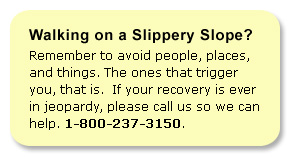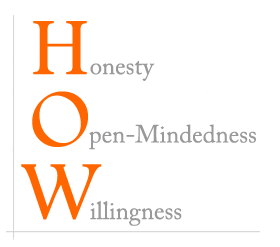|
 Welcome to Our Alumni Newsletter! Welcome to Our Alumni Newsletter!
The best gift you can give your family and friends for the holidays is a clean and sober...you! Making amends in sobriety is important. For those closest to you, one of the best amends you can make is living a life in recovery. And, as we hoped you learned in treatment, you can’t do that on your own.
Our new Alumni Newsletter is one more way to help you stay connected to Stepping Stone Recovery Center and those you met while in treatment. Every quarter we’ll:
- inform you of what’s new at Stepping Stone
- offer help and advice for staying sober
- share the inspiring experience of our alumni
- notify you of upcoming alumni events and resources
We hope you’ll let Stepping Stone continue to be a part of your recovery. If you have any ideas or suggestions for this newsletter, please let us know! Make living free from drugs and alcohol a gift you give every day of the year – one day at a time!
Happy holidays (including a hangover-free New Year’s Day),
- Stepping Stone Center for Recovery |

In This Issue
1. Featured Alumni
2. Facility and Staff
3. How to Maintain Recovery in the New Year
4. Webinar Topic: Healthy Lifestyle Changes
5. Buddy Program

"Spotlight" Featured Alumni
 Jamie W, 35 years old Jamie W, 35 years old
What are you recovering from?
Alcoholism and drug abuse. I started using drugs like pot, LSD, and PCP at age 9. I also drank. By the time I was 14, I quit drugs and only drank alcohol until I was 23 years old. When I was 23, I drank on the weekends and I began snorting cocaine and using ecstasy.
What made you decide to come to SSCR for inpatient treatment?
My brother's friend recommended it. He went to Lakeview Health Systems (Lakeview is the sister program of Stepping Stone Center for Recovery).
I asked my brother about his friend because he has been a chronic relapser. My brother’s friend wasn't able to help himself. But because of him, I went to Stepping Stones Center for Recovery and now I have a year of recovery. Also, I had to meet with my employer regarding my job performance. I decided to ask my employer if I could get inpatient treatment help before my employer terminated me. I knew I was going to lose my job. It was an attempt to keep my job and I did want help at that point. I was never terminated from my job.
Did you make the decision on your own, or did your family, work, courts, church help you with the decision?
My girlfriend had kicked me out. My boss was going to fire me and my bank account was empty. I was depressed, miserable, and the alcohol and drugs stopped working. I could no longer eat because I would vomit. I was full of self-pity and felt hopeless. My girlfriend went to my parents and told them everything that was going on. My parents were supportive of my getting help. They made the first call after my brother told them about his friend who had gone to Lakeview. I knew I needed help and I wanted help at that point.
What did you learn about yourself and your disease while you were at Stepping Stone?
I learned about the allergy and physical addiction of the disease, as well as my schemas and defense mechanisms.
Some of my schemas were approval seeking, caretaking, and defense mechanisms. Today I am aware of how my caretaking is a form of manipulation. Today I ask myself what my motives are. Is it to be the big shot, or am I being egotistical and wanting to be number one? Or am I coming from a place of “how can I help.” Now I prefer to blend in and be a part of. At SSCR, I also learned I had poor impulse control. Since SSCR, I have learned that I can control my feelings and emotions. I have learned to be humble.
While in treatment you were introduced to the idea of changing people, places, and things. What changes have you had to make on your journey of recovery?
Prior to entering treatment at SSCR, I lived in Charlotte, N.C. I followed the suggestion to stay in Florida. I made the decision to stay in the area instead of going back home. I went to a meeting the first day I left SSCR. I got a sponsor and I did 90 meetings in 90 days. I got a home group and got involved in service. I am still involved in meetings, sponsorship, and service. For Thanksgiving I had the opportunity to bring a meeting into SSCR and I felt great being able to celebrate my anniversary month at SSCR.
I was told in treatment that I was a womanizer and that I wouldn't be able to stay out of a relationship for a month. I decided to take the suggestions that were given and not get into a relationship in my first year of sobriety. I have seen one guy hang himself because he got into a relationship too soon in his recovery. I have seen many people relapse because of relationships. I am okay being by myself today and knowing there is a larger plan.
 How do you maintain your sobriety today? How do you maintain your sobriety today?
The first thing I do every morning is pray for another day sober and for the knowledge of God's will for me. Next I read several daily meditations, pages 86 - 88 from the Big Book, and the Saint Francis prayer. I call my sponsor and several other recovering men in the program throughout the day. I attend an AA meeting on a daily basis, and I do a personal daily inventory before retiring at night. Finally I thank my Higher Power for another day sober.
What would you say to someone to help them make the decision to go to inpatient treatment?
The only thing I can share with someone who wants to get sober is my experience. For me, treatment was exactly what I needed to get out of society, and put the focus on me and getting myself well. It was the most important, and best, decision I've ever made.
Give an example of a situation you have done differently since maintaining your recovery.
My recovery is the most important thing for me today. Today I plan my day around my recovery rather than planning my recovery around my day.
Overall, describe how inpatient treatment helped you transition into the real world as a sober productive adult, free from alcohol and drugs. Would you recommend inpatient treatment to someone?
My experience at SSCR was an absolutely awesome experience. It enabled me the time to get out of society and away from alcohol and drugs, and focus on what was causing this to happen. Later I was to find out it was me! I also learned the importance of morning prayer and meditation.
Every morning, we would have a focus group where I would verbalize how I was feeling, my focus for the day, and what I was grateful for. By doing this, I learned how to identify and express my feelings, set a goal for myself, and to express gratitude rather than self-pity. So when I got out of treatment, I was able to look at the good side of most situations and focus on the positive.
I also learned that anything I put in front of my recovery, I will lose. SSCR showed me how to schedule my day around a meeting. I was given a daily personal inventory that I still use today. This personal inventory enables me to look at my actions every day, which then leaves me free to rest at night. I guess my point is THAT IT WORKS!!!!! GOING TO SSCR WAS THE BEST DECISION I'VE EVER MADE!!!!!!

"Spotlight" Facility and Staff
| Awards |
Jerry Polcaro, Family Therapist, received the “Outstanding Performer” award for 2010. Jerry helps families begin the process of healing after addiction.
A special award was given to Anne Alley, Mental Health Tech (MHT), for “Outstanding Performer” in 2010.
Stephanie Smith, Admissions Coordinator, received the “Employee of the Year” award for 2010. |
|
| Births |
Kacie Sasser, Director of Nursing (DON), gave birth to a beautiful baby girl named “Mary Elizabeth Sasser” on November 8, 2010 |
|

Help Yourself by Helping Others
If a family member or friend is in need of help, call an Admissions Coordinator for advice. They can get you a copy of our Intervention Guide, a “how-to” kit for convincing a loved one to get treatment.
Call 1-800-237-3150.

Featured Article
How to Maintain Recovery in the New Year
 The courage to change for the better can be summed up with the acronym “H.O.W.” Honesty. Open-mindedness. Willingness. In treatment you took an honest look at your behaviors and choices, and how your thinking led you down a destructive path. With that awareness, you began to open your mind to the possibility of change. You admitted you were powerless over drugs and alcohol and that your life had become unmanageable. With that awareness, you became willing to change. You learned that you were responsible for your decisions and actions, and with that willingness you chose to live in sobriety, living your life today, one moment at a time. The courage to change for the better can be summed up with the acronym “H.O.W.” Honesty. Open-mindedness. Willingness. In treatment you took an honest look at your behaviors and choices, and how your thinking led you down a destructive path. With that awareness, you began to open your mind to the possibility of change. You admitted you were powerless over drugs and alcohol and that your life had become unmanageable. With that awareness, you became willing to change. You learned that you were responsible for your decisions and actions, and with that willingness you chose to live in sobriety, living your life today, one moment at a time.
The process of change is slow. New patterns take time and consistency to replace old behaviors. Continuing the new, healthy habits learned in treatment is crucial. New insights into your destructive behavior are important. By implementing your aftercare plan, you can help solidify your sobriety. It takes time, attention, and commitment. And of course, you are worth the time and effort. These insights are the foundation of change.
The tools learned in treatment, combined with your developing support group, 12-step meetings, a reliable sponsor, working the steps, and attending to the spiritual aspect of recovery will make maintaining recovery easier. Maintaining sobriety can be simple if you follow the path paved by others who have come before you and who have rebuilt their lives successfully. It takes courage to do the opposite of what was done prior to treatment, but the rewards are well worth it.
The change and growth in recovery happens over time. To use an old expression: “slow and steady wins the race.” For this New Year, make a resolution that you can keep. Sobriety is a way of life, one day at a time. That one day can turn into a lifetime if you take the steps necessary to maintain sobriety. This year is different. This year you are clean and sober.

Alumni Outreach
 We are very excited to announce a new alumni education / self-help feature which will be our first webinar event. The first series of webinars will begin in February 2011. We are very excited to announce a new alumni education / self-help feature which will be our first webinar event. The first series of webinars will begin in February 2011.
Webinar Topic: Healthy Lifestyle Changes
Living a sober life includes maintaining the mind, body, and spirit, and will be a three-part webinar series. The first session will focus on change and our perceptions. The second session will focus attention on positive change and respect for our bodies. The last of this series will address the issue of defining your personal concept of spirituality, and acting upon that concept.
Things to remember that will help reinforce your sobriety on a daily basis:
AA/NA Meetings
- Attend 90 meetings in 90 days to create a healthy habit of meeting attendance.
- Read the suggested literature of the program.
- Listen to learn and learn to listen.
Sponsorship
- Find a sponsor that you can call on a daily basis and begin the process of forming a healthy relationship or friendship.
Step Work
- Complete step work to help propel your recovery forward, release the secret guilt we carry, and provide a road map for daily living. For many years, people have used the steps to maintain sobriety and to continue personal growth.

Buddy Program
 We are in the process of building a buddy program and need alumni to help. This program is designed to connect newly discharged patients with recovering alumni. The buddy system will help those just out of treatment stay focused while they build their local support group. If you are interested in becoming a buddy volunteer, you must have at least a year clean and sober, be attending meetings, and working the 12-step program. If you are interested, please contact Joanna Painton-Hathaway at 1-800-833-9057, or e-mail her at jpainton@steppingstonecfr.com. We are in the process of building a buddy program and need alumni to help. This program is designed to connect newly discharged patients with recovering alumni. The buddy system will help those just out of treatment stay focused while they build their local support group. If you are interested in becoming a buddy volunteer, you must have at least a year clean and sober, be attending meetings, and working the 12-step program. If you are interested, please contact Joanna Painton-Hathaway at 1-800-833-9057, or e-mail her at jpainton@steppingstonecfr.com.
Your participation will help you and others stay clean and sober. “You have to give it away to keep it.”

Inspiration for others can begin with you and your story.
We learn from listening to, or reading how, others have overcome challenges in recovery.
Sharing your thoughts, insights, and triumphs can provide other alumni facing personal challenges with the courage to continue, clean and sober. If you would like to share your story, please call Joanna Painton-Hathaway at 1-800-833-9057, or e-mail her at jpainton@steppingstonecfr.com.
Please feel free to make suggestions for additional topics to be covered in the alumni quarterly newsletter.
|

 The courage to change for the better can be summed up with the acronym “H.O.W.” Honesty. Open-mindedness. Willingness. In treatment you took an honest look at your behaviors and choices, and how your thinking led you down a destructive path. With that awareness, you began to open your mind to the possibility of change. You admitted you were powerless over drugs and alcohol and that your life had become unmanageable. With that awareness, you became willing to change. You learned that you were responsible for your decisions and actions, and with that willingness you chose to live in sobriety, living your life today, one moment at a time.
The courage to change for the better can be summed up with the acronym “H.O.W.” Honesty. Open-mindedness. Willingness. In treatment you took an honest look at your behaviors and choices, and how your thinking led you down a destructive path. With that awareness, you began to open your mind to the possibility of change. You admitted you were powerless over drugs and alcohol and that your life had become unmanageable. With that awareness, you became willing to change. You learned that you were responsible for your decisions and actions, and with that willingness you chose to live in sobriety, living your life today, one moment at a time. We are very excited to announce a new alumni education / self-help feature which will be our first webinar event. The first series of webinars will begin in February 2011.
We are very excited to announce a new alumni education / self-help feature which will be our first webinar event. The first series of webinars will begin in February 2011. We are in the process of building a buddy program and need alumni to help. This program is designed to connect newly discharged patients with recovering alumni. The buddy system will help those just out of treatment stay focused while they build their local support group. If you are interested in becoming a buddy volunteer, you must have at least a year clean and sober, be attending meetings, and working the 12-step program. If you are interested, please contact Joanna Painton-Hathaway at 1-800-833-9057, or e-mail her at jpainton@steppingstonecfr.com.
We are in the process of building a buddy program and need alumni to help. This program is designed to connect newly discharged patients with recovering alumni. The buddy system will help those just out of treatment stay focused while they build their local support group. If you are interested in becoming a buddy volunteer, you must have at least a year clean and sober, be attending meetings, and working the 12-step program. If you are interested, please contact Joanna Painton-Hathaway at 1-800-833-9057, or e-mail her at jpainton@steppingstonecfr.com. Welcome to Our Alumni Newsletter!
Welcome to Our Alumni Newsletter! Jamie W, 35 years old
Jamie W, 35 years old
 How do you maintain your sobriety today?
How do you maintain your sobriety today?